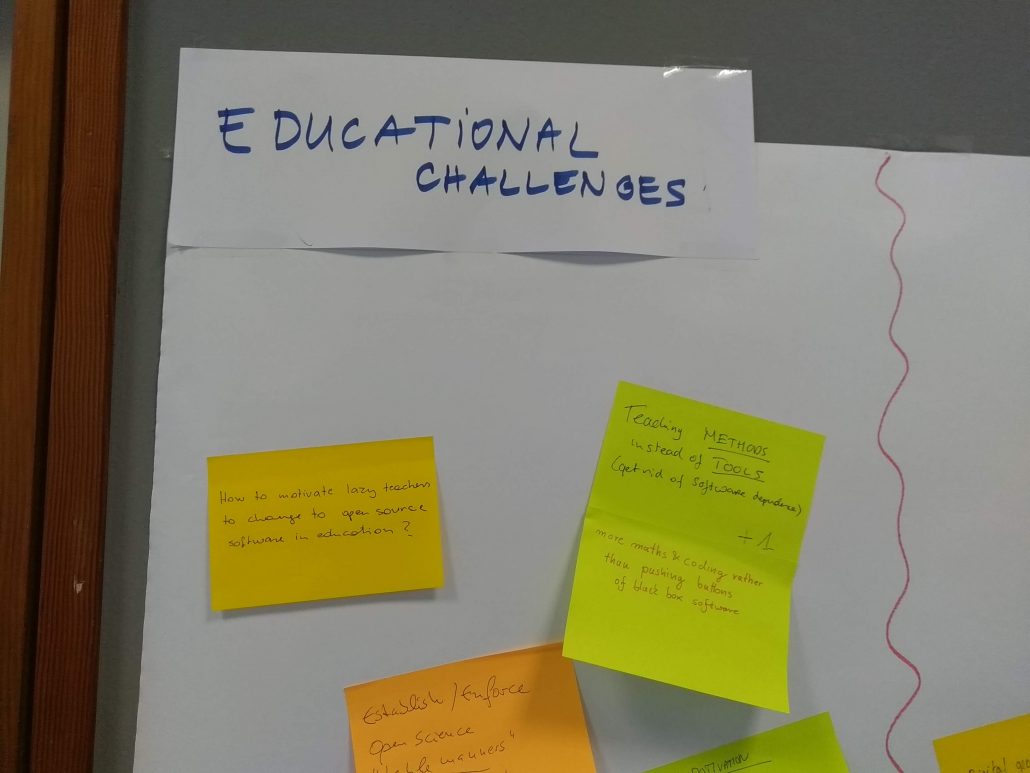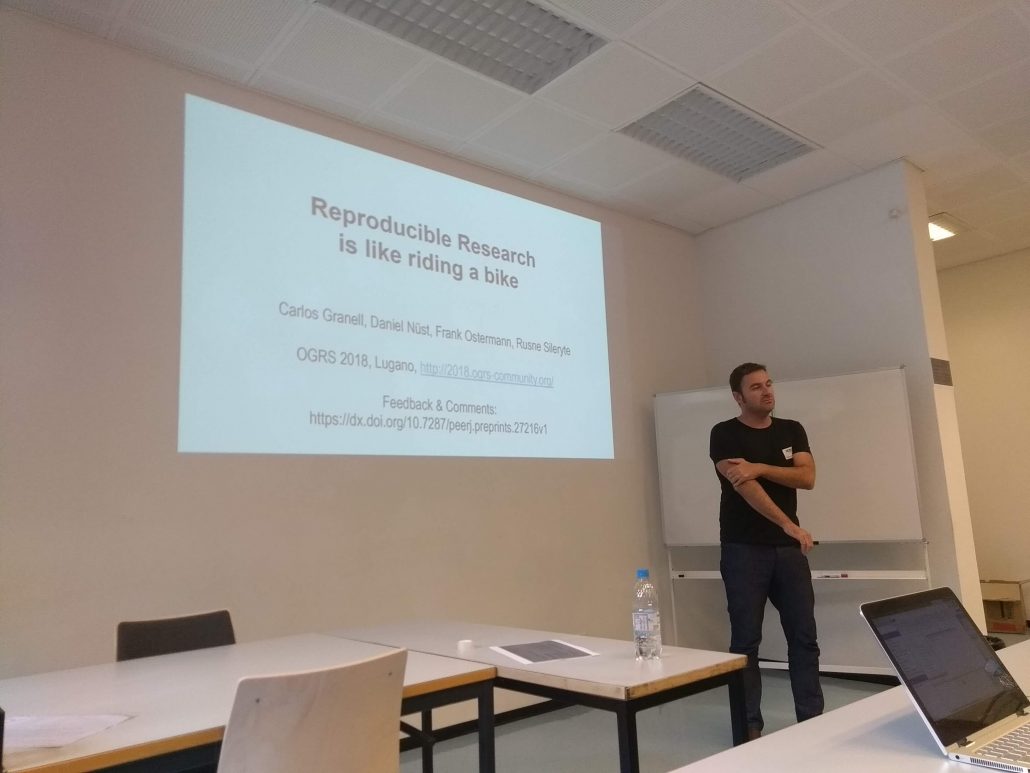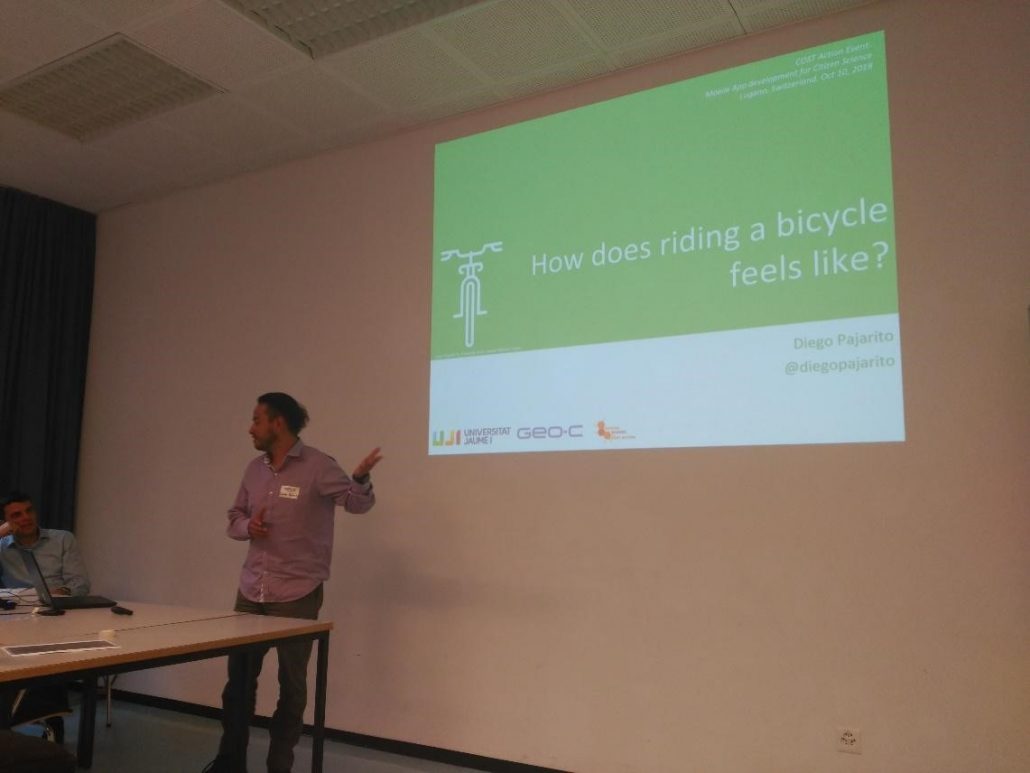
Two presentations and winning app at #OGRS2018 symposium
About 80 people, according to our estimate, attended the 5th Open Source Geospatial Research and Education (OGRS 2018) Symposium (http://2018.ogrs-community.org/) in Lugano, (Switzerland), organized by the SUPSI team (http://www.supsi.ch/home.html).
The event started with an unusual activity: a “collective paper”. Stephane Joost (EPLF) led this activity aimed to identify the top 20 questions in geospatial open research and education. All participants were encouraged to write their own ideas/challenges on sticky notes and put them on a board that was divided into categories such as educational challenges, data management challenges, data analysis challenges, publication challenges, etc. During the last day of the conference, ideas were collected, discussed in groups and the most relevant ones per category/challenge were ranked. Keep tuned for the resulting publication summarizing the top 20 challenges to be addressed by 2030.

Hints for the collective paper
Even though OGRS 2018 celebrated “Open Science in Action” as a motto, a few talks addressed it directly. Well, open science was behind the scene, as most presentations showed open software tools, open data initiatives, citizen science apps, or science communication projects. Two presentations pertinent to Open Science are remarked here, one from GEOTEC; and the Citizen Science Hackathon – (COST Action) winning app by Diego from GEOTEC too.
Luc Henry, EPFL Scientific advisor, gave a talk on “Open Science, why it matters”. His talk was a gentle introduction to the Open Science and Open Publication/Access, making the case that the cost of scientific publishing (due to the Web infrastructure, new technical developments, etc.) are decreasing considerably while the cost of access to scientific content is increasing, leading to an unprecedented gap in terms of great benefits (profit margins) for the publishing industry. Luc claimed that the term Openness reflects the global evolution of society and science, and that the Web was originally intended for Open Science, based on an email from TBL giving the main aims behind the WWW project at CERN. He summarized his talk with two key aspects to incentive “Open Science good practices”: 1/ training people, and 2/ change rewards system. Agreed!
Luc’s keynote was a perfect introduction to Carlos’ presentation next day. “Reproducible Reproducible Research is like riding a bike”. Honestly, my presentation was a kind of outsider in the open software tract. While open software tools were the obvious focus of the other presentations, mine was intended as a dissemination action of our activities towards Reproducible Research within AGILE (see past posts here and here – http://geotec.uji.es/2018/07/13/new-paper-out-reproducibleresearch-and-giscience-an-evaluation-using-agile-conference-papers/, http://geotec.uji.es/2018/07/09/takeaways-of-the-reproducible-research-publication-at-agile2018/), and also as a call for attention/action for adopting reproducible research practices. Two takeaway messages for eager readers. The first one is that reproducible research is not just a checklist, but an ever evolving process. Checklists are useful, of course, but you, as a researcher, must rely on a process-based approach to acquire, engage and continuously reflect on your reproducible research practices. The second key idea was that community-level incentives can accelerate the adoption of RR habits and practices, being the AGILE annual conference series (https://agile-online.org/) the motivating hook to engage contributing authors to AGILE in reproducible practices. You, clever reader, have realized that I did not brought new ideas in my presentation. On the contrary, these conclusions are just common sense. But we must continually remind researchers, especially early stage researchers, to take them into consideration. Otherwise, researchers leave reproducible research practices outside of their daily scientific activities and habits.
The paper is open access (https://doi.org/10.7287/peerj.preprints.27216v1) and is waiting for your comments and suggestions. Abstract’s below.
Reproducibility is a fundamental pillar in science but it has recently been described as hard and challenging to achieve, as stated in numerous editorials and papers, some of which alert on a “reproducibility crisis”. In this article we outline 1/ the approach taken to put Reproducible Research (RR) in the agenda of the GIScience community, 2/ first actions and initial lessons learned towards the discussion and adoption of RR principles and practices in the workflows and habits of researchers, and finally, we present 3/ our short-term strategy (two years) and specific actions to achieve the main goal of making RR an integral part of scientific workflows of the GIScience community.

Carlos presenting “Reproducible research is like riding a bike”
An OGRS 2018 session was dedicated to the Citizen Science COST Action Hackathon. The COST action (https://www.cs-eu.net/) is aimed to develop “a Framework in Science and Technology to promote creativity, scientific literacy, and innovation throughout Europe“. Diego’s work “How does riding a bicycle feels like?” was the winning app of the Hackathon. Diego first introduced his research project framed within the GEO-C programme. Next, he explained how the experiments conducted in Castellón, Muenster, and Valletta supported the idea of open science by providing open software components for future research. He also highlighted his experiences in these cities with respect to cycling patterns and how geospatial technologies supported the identification and comparison of such patterns. He finally introduced the concept of frictions inhibiting bicycle commuting as a tool to compare the cycling environments of the three cities.

Diego presenting “How does riding a bicycle feels like?”
All OGRS 2018 papers are available as a collection of PeerJ Preprints at https://peerj.com/collections/59-ogrs2018/. You can still collaborate participate in OGRS 2018. How? Choose one or more articles of your interest, and feel free to add your comments, feedback and suggestions. Authors will surely thank you.
- Posted by geoadmin
- On 22 October, 2018
- 0 Comments




0 Comments